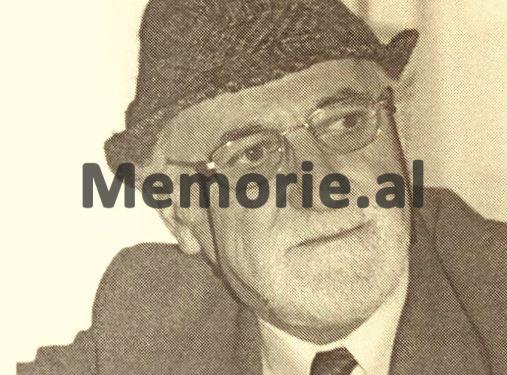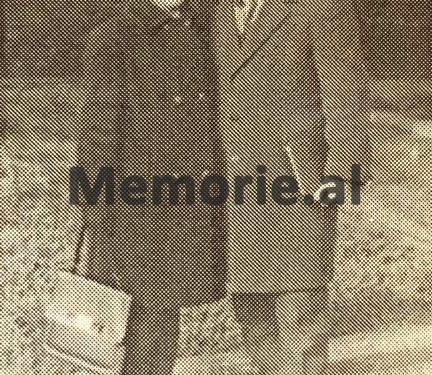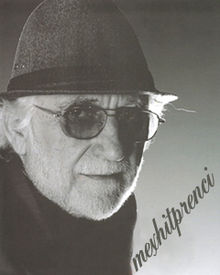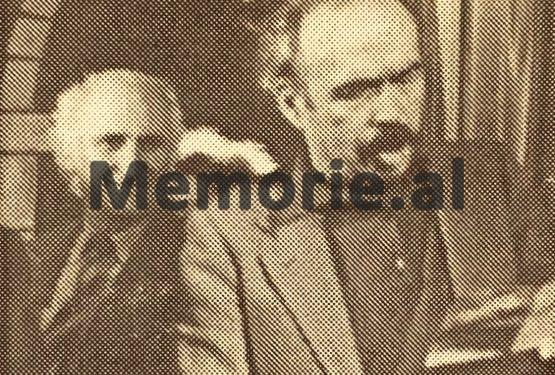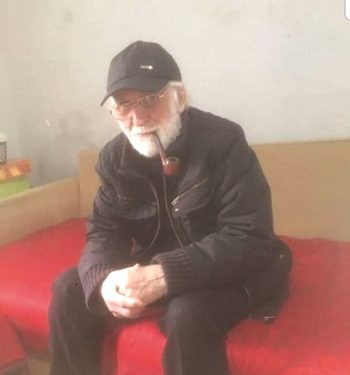Dashnor Kaloçi
Memorie.al publishes the unknown story of Mexhit Premçi, originally from Dibra district, who after graduating from the Higher Institute of Arts in the mid-1960s, was appointed editor-in-chief of the magazine “Theater”, where he worked until in 1973, when the Fourth Plenum of the Central Committee of the PPSh was held, and he was accused of “liberal performances in the field of boycotts” and was sent to the village of Kashar in Tirana, as head of the Cultural Center. Premçi’s testimony regarding the debate with the Deputy Minister of Culture, Mantho Bala, who asked for a list of anti-party writers that he had published their works in the magazine “| Theater”, colleagues and senior officials who criticized him, accused and attacked the meetings held for his unmasking, as well as the defense made by Dritëro Agolli to the Prime Minister, Mehmet Shehu, regarding his novel, “The White Age” which was then sent to be made of cardboard.
“Immediately after the IV Plenum of the ALP, where Enver Hoxha gave the orientation to strike the liberal spirit, in literature and the arts, in all press organs, a real retaliation took place, dismissing most of the leaders, who were charged with responsibility for the spirit they had brought to those bodies they headed. Since the ‘drama’ was severely hit in that plenum, the magazine “Theater” could not escape, where I covered the function of the editor-in-chief, which was a body of the Central House of Popular Creativity. A few days after that plenum, while I was still working in that magazine, Mantho Bala, the Chairman of the Culture and Arts Committee, called me. He asked me to give him a list of names of authors who had written works with ideological errors. The man who speaks and testifies for Memorie.al, is Mexhit Premçi, the former director of the magazine “Theater”, who recounts the situation in which he happened after the Fourth Plenum of the ALP, held in 1973, where he was was fired as editor of that magazine and taken to the village.
What were the accusations made against Premçi and who were the people who drafted them? Who were the dramas that were accused of ideological errors and who were their authors? Why did Mantho Bala ask for the names of the authors who had ideologically erred and why did Mehmet Shehu defend Dritëro Agolli for his drama, “The White Age”. How did Mexhiti respond to the accusations made against him and who were the bosses who accused him, and how was he sent to the village of Kashar? Regarding these, Mexhit Premçi testifies in the following interview in this article.
Mr. Premçi, how did you experience the period after the IV Plenum of the ALP, in which the crackdown on literature and the arts began?
At the time that plenum was held, I was working as the editor-in-chief of the magazine “Theater”, which was a body of the Central House of People’s Creativity. After that plenum in all the press organs, a real retaliation took place, dismissing most of the leaders who were charged with the responsibility for the spirit they had brought to the governing bodies. As the Drama was severely hit in that plenum. Occurring in that situation, it was not difficult to understand that the “lightning bolts that were thrown from above” would definitely fall on us.
Specifically, what was the first “lightning” that would fall on you?
Just a short time after the 4th Plenum, while I was working in the office, my phone rang and the person who called me was Mantho Bala, Chairman of the Committee on Culture and Arts. He asked me to give him a list of the names of the authors who had written works with ideological errors.
What was your response and did you give him that list?
After his orderly tone, I replied, “I can’t give you names.” After my answer almost the same tone, he told me why didn’t I give them to him? I replied that: in the magazine I had run for all those years, I had never published works with ideological errors. And after this answer, Mantho addressed me: “Why did all those who published in you be pure?”
How did you respond?
I went on to explain that the works that had been brought to me for publication could have had ideological errors, due to artistic weaknesses, and therefore I had not published them. So as a result of this selection no sign of influence was placed on the reader. Even after this explanation, Mantho Bala told me in a threatening tone, “I don’t need these, I need names.”
What about after his threat, how did you react?
Even after his persistent insistence, I responded by saying, “Don’t you want to brag in front of the Minister, to get the flag of the war against foreign influences?” He was very revolted by my words, said to me: “You will not help the Party, we will be here” and after those words he hung up the phone.
What happened next to you, and did your case, Mantho Bala, get in the way?
He kept his word at the end of that phone conversation. Only two or three days passed from that conversation, and then began the long meetings and analyzes against me, by the Basic Organization of the Party of the Central House of People’s Creativity, in cooperation with the Party Committee of the Tirana district.
What were the accusations made against them at that meeting, and from whom did they come?
The accusations against me were ideological and came in the context of the “implementation of the decisions of the Fourth Plenum of the Central Committee of the ALP”, which was held only a short time ago. The truth was that in the works that I had published when I was at the magazine “Theater”, there were no ideological mistakes, but they wanted to find mistakes even where there were none. Just for my problem at the time there were several meetings chaired by Llambi Papa, secretary of the Central House of the Creativity Party Committee.
Why did this happen to him, did you have personal problems with each other?
We had no personal problems, but he was a furious Greek-Philo and did not know the Albanian language well. But the main thing was that he was incompetent. Also present at those meetings was Pipi Mitrojorgji, Head of the Central Committee, Head of the Press Committee. And from the Ministry of Culture, came Hulusi Hizmo, who was an inspector in that ministry. As soon as the meeting started, they told me to get up and be self-critical. In the time limit that I had to answer for what I was told, I thought, and so in doubt, I chose a middle ground, where I neither accepted everything nor denied everything.
What did they accuse him of at that meeting?
The charges against me were related to the publication of some plays I had done in the magazine “Theater”, such as the play by Artur Miller “They were all my sons”, “Storm in the cell” by Skënder Luarasi and “The White Age” and Dritëro Agolli. So was my play, entitled “Comrade K and Others.” In the publication of Miller’s play, I was accused of “class humanism.” This was an accusation by Mantho Bala, which in fact did not stand at all and came as a result of his ignorance. For the drama of Skënder Luarasi, you are accused that there was “import of revolution”. This accusation was based on the fact that only on one page of the play, the author, through a Spanish Radio, warned the Albanians that they had fascism on the verge. Even this accusation was an absurdity in itself. While I was analyzing there collectively, the Publishing House “Naim Frashëri” had sent me the name to the Ministry of Culture, as the author of the play “Comrade K and others”, where according to them the figure of the communist and the cadre that came out was discredited. with two faces”.
What was Dritëro Agoll’s drama accused of?
Dritëro Agolli’s drama “White Age” had other problems. At that time, according to the practice that was followed for every drama that was published by us, by sending ten copies to the members of the Politburo, it was also read by the Prime Minister Mehmet Shehu. Mehmeti, after reading that drama, had stated that: ‘in the relationships of the characters, there was excessive freedom’. But apparently, since he was a lover of Dritëro Agolli, he had ordered that the drama not be published, saying: “Do not discredit the author.”
But after that order of Mehmet Shehu, how did you act with Agolli’s drama?
Afterwards, we sent that drama to the specialists in the Central Committee of the ALP, who after seeing it, told us: “Make a card, because Comrade Mehmet has seen this. “It’s better to spend some money than to be in trouble.”
What was your attitude towards all the accusations made against them?
During all the meetings that were held to analyze me, I both objected and criticized myself. Mostly I used to say general things like, ‘I didn’t go deep, I didn’t learn the lessons properly from the party lessons, maybe I didn’t understand the party lessons well’, and so on. When I made the last justification, Pipi Mitrojorgji intervened and said: “The Party does not eat these, we have a specialist for drama. You read the party lessons backwards. ”
Who were the ones who made the harshest criticism of you?
At the last meeting that lasted two days, I was accused of being an accomplice of Fadil Paçarami and the harshest against me were Hulusi Hizmo and a literary proofreader named Nako B., who after the decision of the Party organization was given, stood up. he said: “Let’s take him out of Tirana.”
Were the delegates accusing you of the Literature and Arts accusing you of that meeting?
The biggest comedy was because of all the participants in that meeting where I was analyzed, as well as the delegates, none of them had read the plays about which I was accused. Only Naum Prifti and the director of the Central House of Creativity, Leman Çoçoli, read those works, who protected me as much as the situation allowed.
What was the decision that was made against you at the end of the analysis?
At the end of the meeting that closed and the analysis against me, the decision was made to take me to the village, with the motivation: “For ideological errors in the field of drama publications, he leaves our institution.” After that, they took me to the village of Kashar in Tirana, where I was deprived of the right to publish for years.
Who is Mexhit Premçi?
Mexhit Premçi was born on March 25, 1936, in the village of Reç in Dibra, where his family originated from. After graduating from the Pedagogical High School in Peshkopi, Mexhit was not given the right to pursue higher studies for biographical reasons. His father, Hasan Premçi, had been Zog’s gendarme and in 1946 was sentenced to one year in prison, accused of being an “accomplice of the Lura bayraktar, Hakik Mena”, whom he had as a baxhanak. Since Mexhit’s two parents had died and he had been orphaned since he was a child, he was appointed a teacher in Bulqiza, Lura and in some villages in the Dibra district. After working for five years as a teacher, he gained the right to continue his higher studies, enrolling at the Higher Institute of Arts, “Alexander Moisiu” in Tirana, in the branch of Dramatic Art. He graduated from the Institute of Arts with high results in 1965, and at the request of the Minister of Education and Culture, Fadil Pacrami, he immediately began working as an inspector in that Ministry. After six months of work, by order of Fadil Paçrami, he was sent to Debar and then to the city of Lezha, where he worked for a year as a director of the House of Culture. After that in 1967, he moved to Tirana where he started working as the editor-in-chief of the magazine “Theater”, which was a body of the Central House of Folk Creativity. After serving for 7-8 years in that position, he was removed from there with the motivation “Liberal attitude at work and lack of revolutionary vigilance in publications.” After that, in the framework of the “implementation of the tasks of the IV Plenum of the ALP”, he was sent to the village of Kashar in Tirana, as the head of the Cultural Center. After working for 6 years in that village, Mexhiti was returned to the city of Tirana, renaming him to the magazine “Theater”, where he worked until 1992. After the closure of the magazine “Theater”, Mexhiti was appointed lecturer at the Academy of Fine Arts in Tirana, where until 1997, he taught the History of Albanian and World Theater. Since the mid-1960s, when he graduated from the Institute of Arts, Mexhit Premçi has written and published dozens of critical articles in the field of theater, being considered one of the most vocal critics in this field, to which he has dedicated also a voluminous book, entitled “Critical Optics on Drama.” In addition, he has published other books, as well as ten plays, most of which have been staged, one of which has been made into a feature film. He is currently retired and continues to work, being active with his journalistic writings in the daily press./Memorie.al




